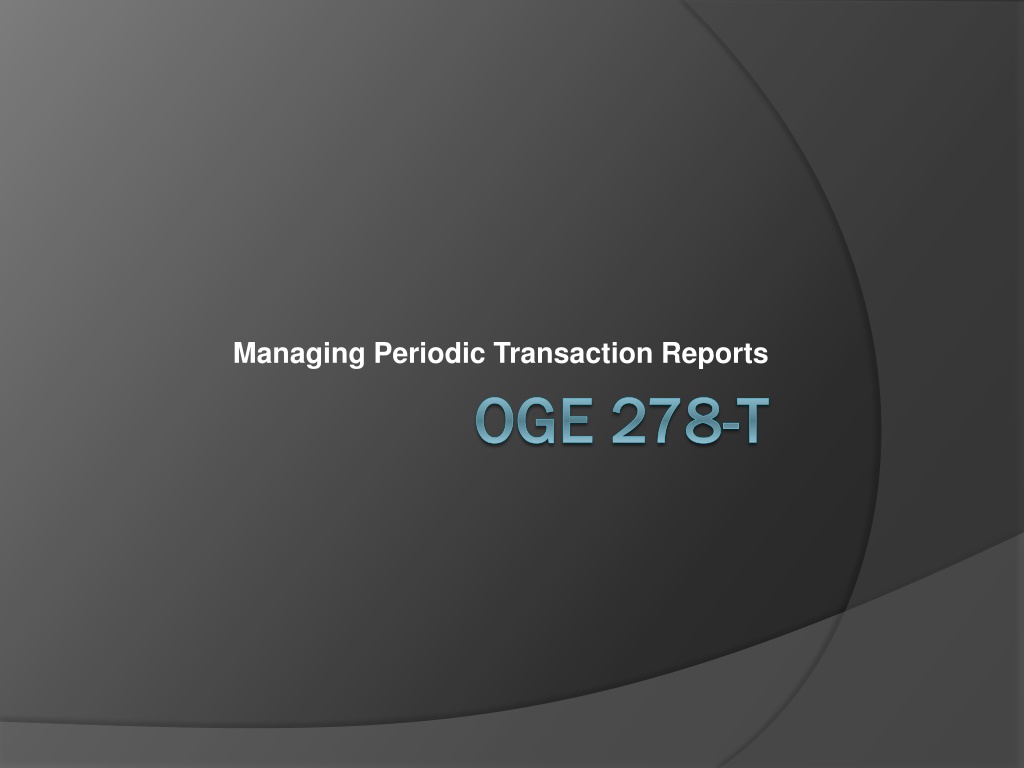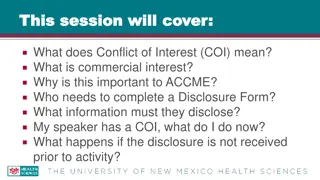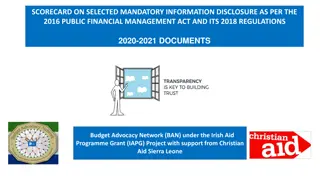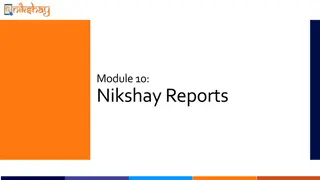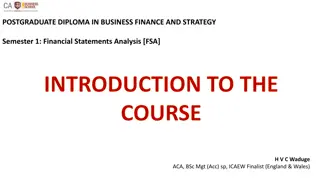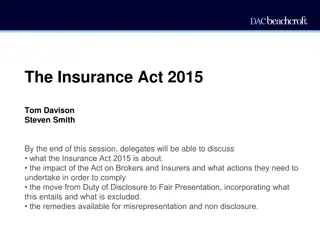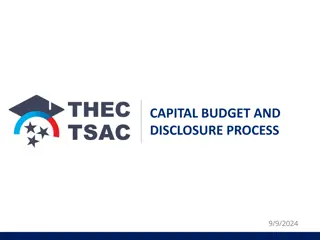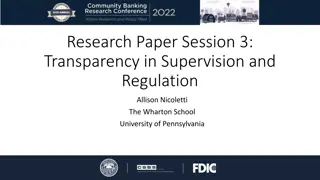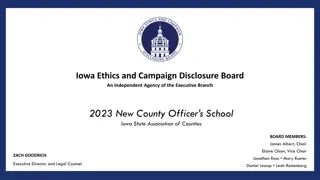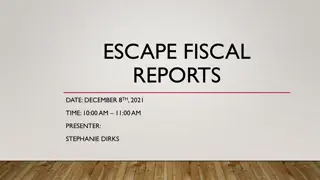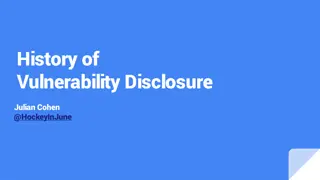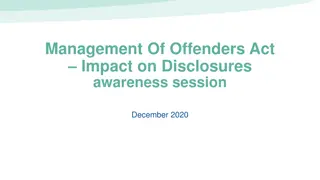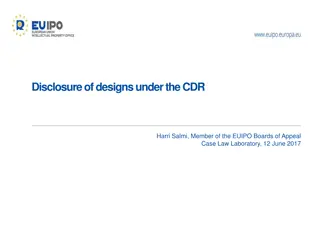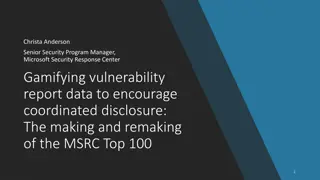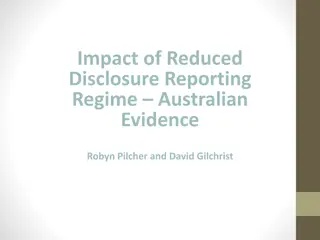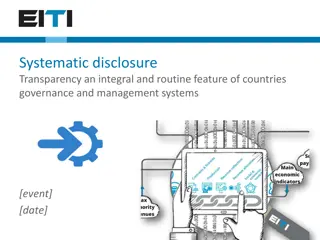Understanding the Importance of 278-T Reports in Public Financial Disclosure
Explore why periodic transaction reports like the 278-T are essential for OGE 278 filers under the STOCK Act, detailing required transactions, exemptions, optional reporting scenarios, and obligations for termination filers and new entrants. Keeping your disclosure flier list up-to-date is crucial to ensure compliance and transparency.
Download Presentation

Please find below an Image/Link to download the presentation.
The content on the website is provided AS IS for your information and personal use only. It may not be sold, licensed, or shared on other websites without obtaining consent from the author. Download presentation by click this link. If you encounter any issues during the download, it is possible that the publisher has removed the file from their server.
E N D
Presentation Transcript
Managing Periodic Transaction Reports OGE 278 OGE 278- -T T
278-T Reports Why are period transactions reports required? The Stop Trading on Congressional Knowledge Act of 2012 (STOCK Act, Pub. L. 112-105) requires that OGE 278 Public Financial Disclosure filers report monthly transaction reports for certain assets.
278-T Report required OGE 278 filers must file reports for transactions that individually exceed $1,000 and involve stocks, bonds, commodity futures and other securities (but not widely diversified mutual funds) for themselves, spouse, and dependent children, within 30 days of receiving notification of a transaction, or 45 days after the transaction.
278-T Report not required Transactions that are exempt from monthly reporting requirements include: Real estate Excepted Investment Funds (mutual funds, exchange traded funds) Life insurance annuities, life insurance U.S. Treasury bills, U.S. notes, U.S. Bonds, cash accounts, U.S. Government retirement plans (TSP) Holdings in qualified blind trusts or qualified diversified or excepted trust.
278-T Report Optional Public filers who have a large number of monthly transactions that consist of some transactions that must be reported on the 278-T and others that are exempt from the 278-T for practical purposes you may want to suggest that the filer report all transactions on a monthly basis.
278-T Report not required Termination filers should include all transactions that occurred within 30 days of filing the termination report on the final 278 report and do not file a separate 278-T report.
Identify 278-T Filers Keep your Public Financial Disclosure filer list current. Advise New Entrants as soon as appointed to the new position New Entrant filers need to report transactions on an OGE 278-T within 30 days of their appointment date
Notify 278-T Filers Provide periodic reminders of the 278-T filing requirement Get your filers on a regular filing cycle, e.g., DOJ has its filers on cycle where the 278-T reports are due on the 15thof each month. Send an Outlook Calendar Reminder for the filers to save to their calendar
278-T Extensions Make sure your DDAEO has delegated extension authority. Extensions are the same as for the OGE 278 up to 90 days. The $200 late fee penalty kicks in after the 30-day grace period which begins at the end of the due date, including extensions.
278-T Late Fee The $200 late filing fee is applicable to any public financial disclosure report filed under title I of EIGA, 5 U.S.C. app. 4, 104(d)(1) (late fee for untimely report ). The $200 late filing fee is applicable to periodic transaction reports, though not to individual transactions. A late fee covers all transactions that the employee could have timely included in a single report. Amendment of a timely filed report does not trigger a late filing fee when the DAEO or the DAEO s designee is satisfied that the employee attempted in good faith to comply fully with applicable disclosure requirements and merely made an inadvertent error or omission. See, OGE Legal Advisory LA-12-04.
Waiver for the Late Fee Agencies have the authority under the EIGA to waive the $200 fee in extraordinary circumstances. 5 U.S.C. app. 4, 104(d)(2); 5 C.F.R. 2634.704(b). The Waiver request must be made in writing and approved by your DAEO or DDAEO.
278-T Report Challenges Self-reporting only the filer knows when there is a reportable transaction Constantly updating financial conflict of interest lists Finding transactions on annual reports that should have been on a 278-T report Filers have difficulty with electronic filing in Integrity
Resources Ethics in Government Act of 1978, Title I, 101 112 5 C.F.R. 2634 STOCK Act Public Law 112-105 OGE Legal Advisory LA-12-04
Questions? Lucy Hurley, Management Analyst EOUSA General Counsel s Office (202) 252-1557 lucyhurley@usdoj.gov Robert Marcovici, Ethics Officer U.S. Marshal Service, Office of General Counsel (202) 307-9728 robert.marcovici@usdoj.gov
